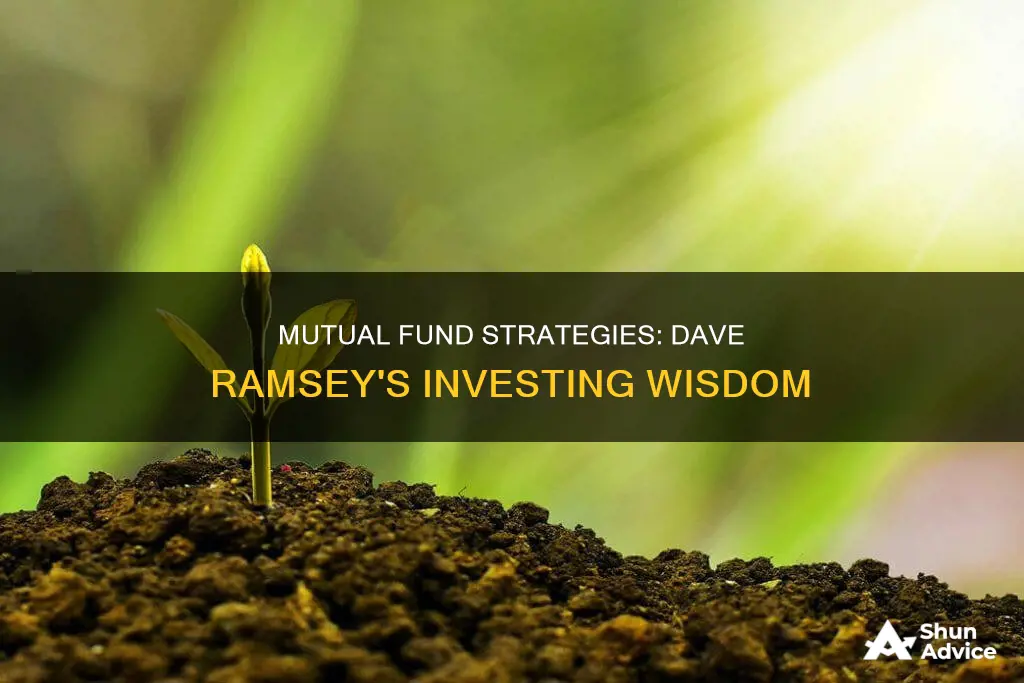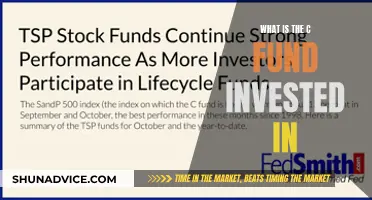
If you're looking to invest in mutual funds, you might want to consider following the advice of money management expert Dave Ramsey. Ramsey recommends investing in four types of mutual funds: growth and income, growth, aggressive growth, and international. He suggests splitting your investments evenly across these four types of funds to minimise risk and ensure a diverse portfolio.
Ramsey advises that you first get out of debt and save up a fully funded emergency fund. Then, you should invest 15% of your income in tax-advantaged retirement accounts, such as a 401(k) or Roth IRA. When choosing which mutual funds to invest in, look for funds with a long track record of strong returns and consider factors such as the fund manager's experience, the business sectors covered, and the costs involved.
Remember to keep a long-term perspective and invest consistently. Don't try to time the market or chase returns. Instead, focus on consistently investing month after month, year after year. Consider working with a financial advisor or investment professional who can guide you in making informed investing choices.
| Characteristics | Values |
|---|---|
| Number of types of mutual funds to invest in | 4 |
| Types of mutual funds to invest in | Growth and Income, Growth, Aggressive Growth, International |
| Recommended investment in each type of mutual fund | 25% |
| Recommended investment in stock mutual funds | Yes |
| Recommended investment in bond funds | No |
| Recommended investment in money market funds | No |
| Recommended investment in income mutual funds | Not mentioned |
| Recommended investment in hybrid mutual funds | Not mentioned |
| Recommended investment in sector funds | No |
| Recommended investment in socially responsible funds | Not mentioned |
| Recommended investment in commodity funds | No |
| Recommended investment in index funds | Not mentioned |
What You'll Learn

Invest in growth, growth and income, aggressive growth, and international mutual funds
Dave Ramsey is a well-known personal finance guru and has advised millions of people on how to manage their money and investments. While his advice is often sound and based on common sense, it is essential to recognise that his strategies may not always be the best for everyone. Here is a detailed and instructive breakdown of his approach to investing in mutual funds:
Dave Ramsey recommends investing in mutual funds, specifically growth, growth and income, aggressive growth, and international mutual funds. These types of funds offer investors diverse portfolios and the potential for significant returns.
Growth mutual funds focus on capital appreciation, investing in companies that offer strong potential for share price growth. These funds typically carry higher risk but offer the opportunity for substantial gains. Growth and income funds, on the other hand, provide a balance between capital growth and regular income. They invest in a mix of stocks and dividend-paying companies, offering investors the potential for both share price appreciation and steady income.
Aggressive growth funds are ideal for those seeking rapid capital appreciation. These funds invest in small start-up companies or emerging industries, offering high return potential but carrying substantial risk. International mutual funds provide exposure to global markets, allowing diversification beyond domestic borders and the chance to benefit from international economies' growth.
When investing in mutual funds, Ramsey suggests a "buy and hold" strategy, where investors commit for the long term, riding out short-term market fluctuations. This aligns with his philosophy of patient, disciplined investing, where consistent contributions over time can lead to substantial gains.
To start, Ramsey recommends working with an investment professional or financial advisor to guide you in selecting the right mix of mutual funds based on your financial goals, risk tolerance, and time horizon. Understanding the fees associated with mutual funds is essential, ensuring transparency and reasonableness in expenses and potential sales charges.
By following Ramsey's advice, investors can build a solid foundation for their investment portfolios, taking advantage of mutual funds' growth potential while also diversifying their assets across different fund categories.
Liquid Fund Investment: Axis Liquid Fund Guide
You may want to see also

Understand the difference between small-cap, medium-cap, and large-cap funds
Understanding the difference between small-cap, medium-cap, and large-cap funds is essential when investing in mutual funds. Here's a detailed breakdown of each:
Small-Cap Funds
Small-cap funds invest in small companies with a market value between $300 million and $2 billion. These companies are typically young and serve niche markets or emerging industries. Small-cap funds are considered the most aggressive and riskiest type of investment among the three cap sizes. They offer the potential for high returns but also come with significant volatility. The stock prices of small-cap funds can fluctuate wildly, and investors need to be prepared for the highs and lows. Investing in small-cap funds is suitable for those seeking substantial growth potential and are willing to tolerate the associated risks.
Medium-Cap Funds
Medium-cap funds focus on companies with a market value between $2 billion and $10 billion. These companies are usually more established and are often in industries experiencing rapid growth or expected to grow significantly. Medium-cap funds offer a balance between the higher risk of small-cap funds and the lower growth potential of large-cap funds. They generally provide moderate growth and volatility, falling between small-cap and large-cap funds in terms of risk and return. Medium-cap funds are suitable for investors seeking a combination of growth potential and relatively lower risk compared to small-cap funds.
Large-Cap Funds
Large-cap funds invest in well-known, established companies with a market value of more than $10 billion. These companies often have a long history of producing quality goods and services and are dominant players in their industries. Examples include Amazon, Microsoft, and JPMorgan Chase. Large-cap funds are considered safer investments than small-cap or medium-cap funds due to the stability and track record of the underlying companies. However, the trade-off is that large-cap funds generally offer less growth potential. They are suitable for investors seeking a more conservative approach with a focus on slower but steadier growth.
It's important to note that the size of a company, as indicated by its market cap, is just one factor to consider when investing in mutual funds. Other factors, such as the company's business model, industry, and financial health, also play a significant role in investment decisions. Diversification across different cap sizes and other types of investments is generally recommended to reduce risk and maximise return potential.
Strategies for Investing Endowment Funds: A Comprehensive Guide
You may want to see also

Know the risks of investing in bond funds
While bonds are often considered a "safe" investment, there are several risks to be aware of when investing in bond funds.
Firstly, it's important to understand that bonds are a type of loan between an investor and a corporate or government borrower. The borrower promises to repay the investor's money with interest. While bonds are often backed by governments and seen as safe, they typically offer lower returns compared to the stock market. For example, a $1,000 bond with a 5% annual interest rate will only yield $2,000 after 20 years, while a $1,000 investment in the stock market with a 10-12% return could grow to $2,650 or more in the same period.
Additionally, investing in bonds can carry several risks, including default risk, interest rate risk, inflation risk, liquidity risk, and call risk. Default risk refers to the possibility that the issuer may not be able to repay the bond, resulting in a loss of principal and interest. Interest rate risk means that if overall interest rates rise, the value of existing bonds with lower interest rates may decrease, leading to a loss if sold before maturity. Inflation risk occurs when low-interest rates and high inflation erode the purchasing power of the bond's returns. Liquidity risk is the chance that an investor may not be able to sell their bonds when desired, leading to a lack of access to their invested funds. Lastly, call risk is when a bond issuer "calls" or retires a bond before its maturity date, usually due to declining interest rates, forcing the investor to reinvest at a lower rate.
It's also worth noting that Dave Ramsey does not recommend investing in bonds, CDs, or cash. He suggests that even those close to retirement should have their funds invested in equities. However, others argue that diversifying investments with bonds is important, especially for those nearing retirement, as bonds provide stability and reduce the overall risk of a portfolio.
Therefore, while bonds may offer a steady and relatively low-risk investment option, it's crucial to understand the potential risks involved and consider other investment alternatives to make an informed decision.
Gold Fund Investment: A Smart and Secure Financial Move
You may want to see also

Avoid money market funds
Dave Ramsey is a well-known personal finance expert who has authored several best-selling books and hosts a radio show with millions of listeners. Ramsey Solutions has taught millions of Americans how to get out of debt, save for emergencies, and build wealth.
Ramsey recommends investing in mutual funds, specifically growth stock mutual funds, as part of his investing philosophy. However, he advises against investing in money market funds.
Money market funds invest in short-term debt securities, such as loans to governments, banks, and companies, that are expected to be repaid within a year. These funds often have low average rates of return, sometimes as low as 3%, which may cause your money to lose value over time if inflation rises above that rate.
Ramsey compares money market funds to a bouncer for your money, keeping it safe but too afraid of risk to allow for growth. He emphasizes that taking some risk is necessary for growing your money, and money market funds do not provide a good opportunity for building wealth.
Instead, Ramsey suggests focusing on growth stock mutual funds, which historically have an average annual rate of return between 10% and 12%. He recommends dividing your investments equally between four types of funds: growth and income, growth, aggressive growth, and international. This diversification strategy helps lower investment risk by spreading your money across numerous companies in different industries worldwide.
In summary, while Dave Ramsey advocates for investing in mutual funds, he advises against money market funds due to their low returns and limited growth potential. Investors should be willing to take on some risk to grow their money effectively.
Invest in Your Health: Old National Bank HSA Guide
You may want to see also

Work with a financial advisor
Working with a financial advisor can be extremely beneficial, even if you are not new to investing. A financial advisor's role is to help you meet your retirement goals and keep you informed about investing news and trends.
It is important to find a financial advisor who is committed to helping you make informed decisions with your money. Dave Ramsey recommends trying SmartVestor, a free and easy way to find investing advisors in your area.
A good financial advisor should give you insight and direction based on their years of experience. They should take the time to answer your questions and ensure you have all the information you need to make good investing choices.
Remember, you are the decision-making boss. Don't invest in anything until you understand how it works.
Hedge Fund Titans: Why They Love This Charity Investment
You may want to see also







